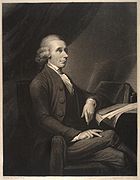
An History of the Corruptions of Christianity
Encyclopedia

Joseph Johnson (publisher)
Joseph Johnson was an influential 18th-century London bookseller and publisher. His publications covered a wide variety of genres and a broad spectrum of opinions on important issues...
in 1782, was the fourth part of 18th-century Dissenting
English Dissenters
English Dissenters were Christians who separated from the Church of England in the 16th, 17th and 18th centuries.They originally agitated for a wide reaching Protestant Reformation of the Established Church, and triumphed briefly under Oliver Cromwell....
minister Joseph Priestley's
Joseph Priestley
Joseph Priestley, FRS was an 18th-century English theologian, Dissenting clergyman, natural philosopher, chemist, educator, and political theorist who published over 150 works...
Institutes of Natural and Revealed Religion
Institutes of Natural and Revealed Religion
The Institutes of Natural and Revealed Religion, written by 18th-century English Dissenting minister and polymath Joseph Priestley, is a three-volume work designed for religious education published by Joseph Johnson between 1772 and 1774...
(1772–74).
Summary
Priestley's major argumentArgument
In philosophy and logic, an argument is an attempt to persuade someone of something, or give evidence or reasons for accepting a particular conclusion.Argument may also refer to:-Mathematics and computer science:...
in the Institutes is that the only revealed religious truths that can be accepted are those that also conform to the truth of the natural world. Because his views of religion were deeply tied to his understanding of nature, the text's theism
Theism
Theism, in the broadest sense, is the belief that at least one deity exists.In a more specific sense, theism refers to a doctrine concerning the nature of a monotheistic God and God's relationship to the universe....
rests on the argument from design. Many of Priestley's arguments descended from 18th-century deism
Deism
Deism in religious philosophy is the belief that reason and observation of the natural world, without the need for organized religion, can determine that the universe is the product of an all-powerful creator. According to deists, the creator does not intervene in human affairs or suspend the...
and comparative religion
Comparative religion
Comparative religion is a field of religious studies that analyzes the similarities and differences of themes, myths, rituals and concepts among the world's religions...
. The Institutes shocked and appalled many readers, primarily because it challenged basic Christian orthodoxies, such as the divinity of Christ
Christ
Christ is the English term for the Greek meaning "the anointed one". It is a translation of the Hebrew , usually transliterated into English as Messiah or Mashiach...
and the miracle of the Virgin Birth
Virgin Birth
The virgin birth of Jesus is a tenet of Christianity and Islam which holds that Mary miraculously conceived Jesus while remaining a virgin. The term "virgin birth" is commonly used, rather than "virgin conception", due to the tradition that Joseph "knew her not till she brought forth her firstborn...
. Priestley wanted to return Christianity to its "primitive" or "pure" form by eliminating the "corruptions" which had accumulated over the centuries. The fourth part of the Institutes, An History of the Corruptions of Christianity, became so long that he was forced to issue it separately. Priestley believed that the Corruptions was "the most valuable" work he ever published.
Schofield, Priestley's major modern biographer, describes the work as "derivative, disorganized, wordy, and repetitive, detailed, exhaustive, and devastatingly argued." The text addresses issues from the divinity of Christ to the proper form for the Lord's Supper. Thomas Jefferson
Thomas Jefferson
Thomas Jefferson was the principal author of the United States Declaration of Independence and the Statute of Virginia for Religious Freedom , the third President of the United States and founder of the University of Virginia...
would later write of the profound effect that Corruptions had on him: "I have read his Corruptions of Christianity, and Early Opinions of Jesus, over and over again; and I rest on them . . . as the basis of my own faith. These writings have never been answered." Although a few readers such as Jefferson approved of the work, it was generally harshly reviewed because of its extreme theological positions, particularly its rejection of the Trinity
Trinity
The Christian doctrine of the Trinity defines God as three divine persons : the Father, the Son , and the Holy Spirit. The three persons are distinct yet coexist in unity, and are co-equal, co-eternal and consubstantial . Put another way, the three persons of the Trinity are of one being...
.
See also
- Joseph Priestley and educationJoseph Priestley and educationJoseph Priestley was a British natural philosopher, Dissenting clergyman, political theorist, and theologian. While his achievements in all of these areas are renowned, he was also dedicated to improving education in Britain; he did this on an individual level and through his support of the...
- Joseph Priestley and DissentJoseph Priestley and DissentJoseph Priestley was a British natural philosopher, political theorist, clergyman, theologian, and educator...
- List of works by Joseph Priestley
External links
- An History of the Corruptions of Christianity at Google Books

